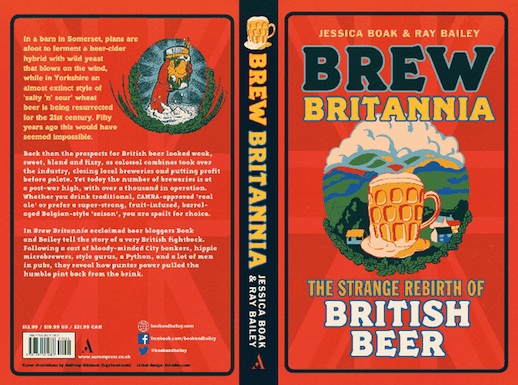Brew Britannia: The Strange Rebirth of British Beer by Jessica Boak and Ray Bailey. (Aurum Press, June 2014).
Review by Ben McCormick.
Waiting for Godson’s. I swear the story of the east London early eighties brewery’s untimely demise was prefaced in chapter four of Brew Britannia, beer-blogging royalty Boak and Bailey’s first foray into print. Yet 213 pages later and only the index left to read and I’m still none the wiser. The book reading equivalent of Bill Rawls’s fleeting appearance in a gay bar during season 3 of The Wire that was dropped in as a potential cliff-hanger and never mentioned again.
That this is the only real disappointment in a book that charts the story of British beer’s struggle for survival against the drinking equivalent of what Ian Nairn dubbed Subtopia – and its subsequent rebirth into a thriving and varied industry – is testament to the authors’ enthusiasm for the subject and the fascinating personalities their research has uncovered.
Against a backdrop of market consolidation – in which the ‘big six’ brewery groups were buying up and closing down hundreds of Britain’s cherished beermakers – a small group of plucky, pipe-smoking bankers and former military men took up arms in an attempt to turn back the tide of homogenisation and ruin of the drink they had come to love. Their first meeting is described like something out of a 1940s Ealing comedy and even the name of their organisation – the Society for the Protection of Beer from the Wood (SPBW) – sounds like this bizarre bunch are planning on rejecting their suburban surroundings and taking up with sylvan brewers in some attempt to get back to the garden.
While they are portrayed playfully, the authors do so with the kind of respect they’d reserve for people who – in their way – helped lay the foundations for the beer scene we know today. Because although the band of beery brothers was ultimately fairly ineffectual – though, we learn, it still exists and meets regularly – it helped inspire a much more potent campaign that was to ruffle the feathers of the bigwigs and fight successfully for the survival of our national drink.
One of the more striking things about this book is the way it made me reassess my growing unease with the Campaign for Real Ale (CAMRA). Now, as it seems to be searching for relevance since its original battle has been won, it’s easy to forget CAMRA’s contribution and the valuable work it did in stopping the profit-obsessed behemoths riding roughshod over the flavour of British beer. The more I read about the people behind it, the more I came to like them. It’s fair to say when this book delves deeper in to some of those who play their own unique parts in the story of British beer over the last 50 or so years, it really comes to life.
From the archaic wood preservers via the louche London landlady of Becky’s Dive Bar to David Bruce, the founder of the first Firkin pub, the cast of players unearthed by Boak and Bailey’s investigation is rich and varied. An oddly eclectic lot, they all share the same fundamental desire to make beer or drinking it interesting again.
As the pages progressed at a healthy pace and the story became more familiar – although the odd gem like BrewDog founder Martin Dickie having started out at Thornbridge was news to me – I found the book less engaging. That could be down to the characters no longer appearing as innocently enthusiastic and seeming more cynical. Or maybe the more recent history hasn’t had the chance to develop context yet. Perhaps I’m looking back on the distant past with the kind of added fondness you do with the advancing years. But I rattled through the pages all the same, doubtless hoping to hear about Godson’s end now my appetite had been whetted.
Almost as an epilogue, the story comes full circle as the final chapter sees an older generation still striving to save the traditional pint. They don’t have the energy of the current beer scene’s protagonists and certainly possess none of the chutzpah their juniors have in spades. They may not be at the cutting edge of brewing and they’re acutely aware of the dwindling ripples their cause provokes these days.
But as is so often the case, they’ve got it right, these elders, as one of their number observes about the BrewDog Shoreditch in the book’s ultimate comment: “And I just think it’s good to see all those youngsters in there, taking a real interest in beer.”
If you’ve even only a fleeting interest in how it is your choice of beer in pubs is as wide as it is these days, you should pick up this book and digest its contents over a pint or two. Just don’t expect to find out what terrible misfortune met Godson’s.
